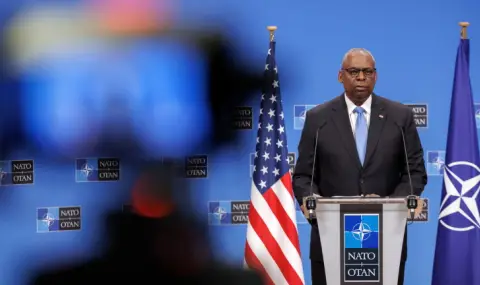The United States must maintain its military presence in Syria to prevent the Islamic State group from becoming a threat again as a result of the fall of the Bashar Assad government, US Defense Secretary Lloyd Austin said in an interview with the Associated Press, BTA reported.
US forces are still needed there, mainly to guarantee the security of the detention camps for the tens of thousands of former Islamic State fighters and their families, the Pentagon chief said in one of his last interviews in that capacity.
According to various estimates, between 8,000 and 10,000 fighters from the group are being held in the camps, and at least 2,000 of them are believed to be very dangerous.
"In my opinion, if Syria is unprotected, ISIS fighters will become one of the main currents again," Austin said at the Ramstein Air Base in Germany, where he arrived to discuss military aid to Ukraine with about 50 other partner countries. He used another acronym for the group "Islamic State" ("Islamic State of Iraq and the Levant", ISIS - ed.).
In 2018, during his first term, US President-elect Donald Trump tried to withdraw all US forces from Syria, which caused former Defense Secretary Jim Mattis to resign. Last month, during the offensive by the "Hayat Tahrir al-Sham" group against Assad, Trump published a post on social networks in which he indicated that Washington's military should stay out of this conflict.
The US maintains a contingent of about 2,000 of its soldiers in Syria, whose task is to fight the "Islamic State"; this is much more than the claims made for years by officials, according to which their number is 900 people. They were sent to Syria in 2015 after the radical group seized large swathes of territory in the Middle East.
The continued U.S. military presence has been called into question by the rebels' lightning offensive that ended the long rule of Assad and his family on Dec. 8.
U.S. forces are working alongside the Kurdish-led Syrian Democratic Forces (SDF) in operations against the Islamic State group, providing support to the group, which Turkey considers an offshoot of the Kurdistan Workers' Party (PKK), which Ankara has designated a terrorist group.
The transitional government in Syria is still taking shape, so it is unclear what will happen next.
The SDF "were good partners." "At some point, the SDF could become part of the Syrian army and then Syria could take over and hopefully maintain control of all the (ISIS) camps," Austin said. "But for now, I think we need to protect our interests there."
